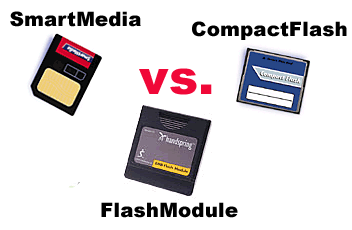A number of questions have come up about SmartMedia versus CompactFlash, not
just in the Visor world, but generally. I am a self-admitted CF Fan since
my Digital Camera uses it, and they are easy to find in large formats.
But, I have also a Rio500 MP3 Player that uses SmartMedia and I am starting to
see the benefits of them as well.

There have been a lot of claims about the technical superiority of SmartMedia
and CompactFlash over one another, none proved or disproved so far in my "lab."
As far as I'm concerned, I see that SmartMedia is "superior" against CF on a few
important issues. It's smaller, uses about 5 times less power when
read/writing and approximately 1000 times less power (depending on who you ask)
when it's in standby mode.
There are a number of Flash Memory solutions both from Handspring and
Hagiwara Systems. I use a 16Meg Hagiwara Flash module a lot. Flash
Modules are automatically recognized and useable by the OS. Most
applications can be copied to Flash Memory and ran from there. As long as
an application doesn't write to itself or do anything stupid it will run from
Flash. The FileMover application that comes with Flash Memory will warn
you when you try to move a Writeable Database to Flash. So, I can keep
Tetris on Flash, but my Tetris Highscores stay in memory. The rule is, copy it
to Flash, and if it works it works, and most do.
Now, Palm OS4.0 allows something called "VFS" or Virtual File System, that
should allow removable storage solutions like SmartMedia and CompactFlash to
operate in a similar way while remaining very compatible. The Palm m500
series includes this support with SD or Secure Digital cards. Presumably
developers for PalmOS 4.0 solutions will be able to create "pluggable file
systems" to accomplish this with SmartMedia and CF.
Currently SmartMedia and CF cards look like disk drives to the Motorola
Dragonball Processor, the CPU that drives all current Palm Devices.
Solutions like PiDirect from Portable Innovation and AutoCF from TRGPro will
automatically copy an application from a storage card when it's run, then delete
it when it's done. This effectively simulates the behavior of a standard
Flash Memory Springboard, but is usually slower. One unfortunate
side-effect of a complex software solution like this is compatibility. Due
to limitations in the Palm OS, AutoCF and PiDirect only work on PalmOS 3.5
devices which is a huge bummer. I've talked to developers at Portable
Innovation and believe me, it's not that they don't want to make a PalmOS 3.1
solution, it apparently isn't physically possible. VisorCentral will
provide more on this issue when it comes in.
As far as speed, I haven't noticed any speed differences using CF or
SmartMedia on my Visor Prism. Presumably this is because both formats are
very speedy, but the bottleneck is clearly the speed of the Visor, not the
media. I will say this though, copying a 1 meg PRC can be very fast
(<20secs) but copying 20 PRCs at 50K each can take on order of minutes.
Using Backup solutions like the Handspring Backup Module are typically much
faster than File-based systems like PiBackup and JackBack's File Mode (not memory
image mode) since they have to open and close many databases rather than taking
a memory snapshot.
My Opinion >>